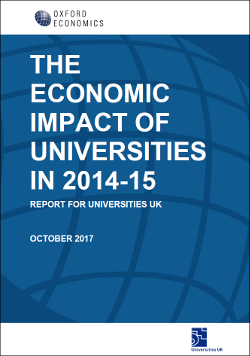Ungated Post | 16 Oct 2017
The Economic Impact of Universities in 2014-15

This report for Universities UK investigates the contribution of the the higher education sector to the UK economy. It identified that in 2014-15, Universities directly employed 404,000 people, created a £21.5 billion gross value added contribution to UK GDP, and generated £5.3 billion in tax receipts.
The importance of universities to the economy goes far beyond this direct contribution, however. By spending money in the wider economy, students, visitors to them, and universities themselves, support economic activity in a wide range of industries. Adding these economic effects together means that in 2014-15, universities supported a total gross value added contribution of £52.9 billion to UK GDP―2.9 percent of the country’s total economic output. They sustained 940,000 jobs, 3 percent of total UK employment, and generated £14.1 billion in tax receipts, 2.7 percent of UK Government tax revenue in the year.
For the first time in this series of reports, Oxford Economics has also explored the impact of universities on the productive capacity of the UK economy. Through higher education, universities provide students with skills and knowledge, which, in 2014-15, boosted the UK’s human capital stock by an estimated £63 billion. Further, their £7.9 billion of research and development activities in the year were estimated to deliver a stream of private and social returns equivalent to £28.9 billion gross value added, or £1,000 in income per household.
Oxford Economics’ team is expert at applying advanced economic tools that provide valuable insights into today’s most pressing business, financial, and policy issues.
To find out more about our capabilities, contact:
Americas
Diantha Redd
+1 (646) 503 3052
Email
Asia Pacific
Peter Suomi
+65 6850 0110
Email
EMEA
Aoife Pearson
+44 (0)203 910 8054
Email
Related Services

Post
The Economic Footprint of JLR in the UK
This report examines the economic footprint of JLR in the United Kingdom in 2024. The analysis is conducted both at the national level, as well as on the West Midlands and North West regions, where JLR’s main facilities are located.
Find Out More
Post
Airbnb’s Economic Contribution to APAC in 2024: GDP, Jobs, and Regional Impact
Airbnb's platform connects hosts across Asia Pacific (APAC) with travellers from around the world. Oxford Economics was commissioned by Airbnb to quantify its economic footprint in 10 APAC markets in 2024.
Find Out More
Post
Economic Insights: Airbnb’s Contribution Through the Lens of Oxford Economics
Oxford Economics Australia delivered a tailored economic impact assessment for Airbnb, including GDP contribution modelling, job creation analytics, guest‑spend segmentation, and regional tourism dispersion insights to underpin Airbnb’s stakeholder communications and strategic growth initiatives.
Find Out More